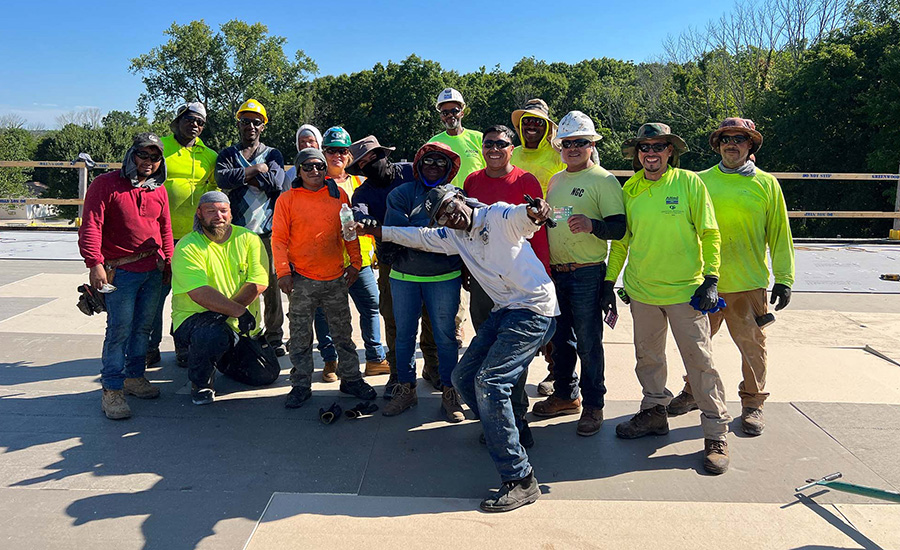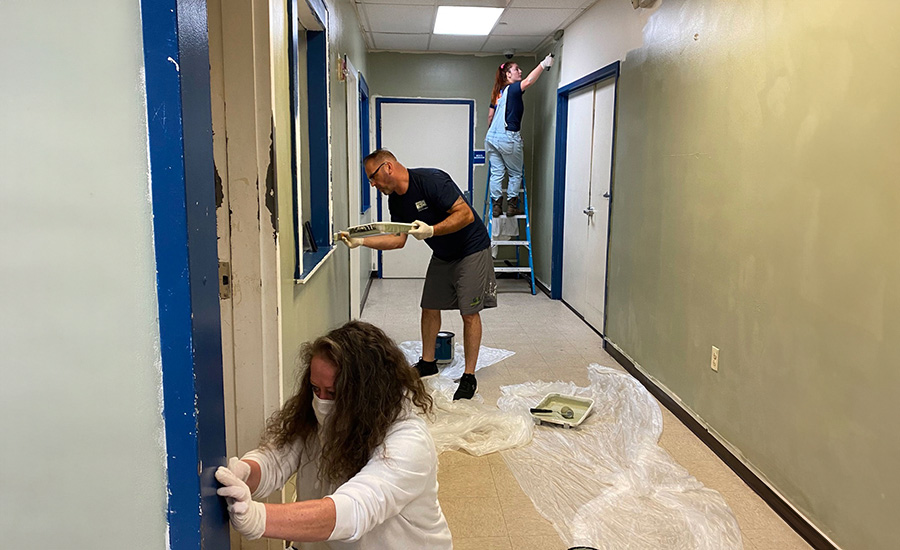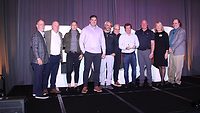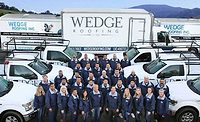Limitless
2023 Commercial Contractor of the Year: Greenwood Industries

Photos courtesy of Greenwood Industries.
At first blush, Greenwood Industries looks and sounds like it could be a Fortune 500 corporation, a legacy company with a long history of innovative success, or a vehicle for ambitious future growth that includes an international footprint.
It could be all three — and more — according to the commercial roofing company's leaders, Owner and President Dave Klein and Chief Operating Officer Matt Brown. But the two long-time business partners and life-long friends say, at its heart, Greenwood is simply a roofing and waterproofing company dedicated to its craft while finding solutions regardless of perceived limitations.
Barely in business for three decades, the Worcester, Mass.- based enterprise installs all types of commercial roofing, as well as architectural metal, green roofs, and waterproofing, as well as a robust maintenance and service department. Upon developing a niche for historical projects, crews also provide intricate masonry restoration and repair.
"We always felt like we should never limit ourselves as a company to one type of work," Klein said. "When you get into the roofing business, you'll find guys that just do shingles, or just do EPDM, or only do built-up very well,” he added. “For us, it's always been that mindset: there's no reason we can't train our guys and learn what needs to be done; so, if it can be done, we can do it — and that's always been our approach."
It's working.
For nearly three decades, the company has grown a reputation for tackling tough jobs, whether they be historic buildings throughout New England or cutting-edge architecture reinvigorating metropolitan aesthetics in thriving downtowns.
In recent years, Greenwood’s more than 900 union workers have executed award-winning workmanship on some of the most complex and innovative building designs across the Northeast, both in rural communities and within large municipalities. The company has also worked on historic icons, including Boston's Fenway Park.
Greenwood’s consistent success and shrewd expansion moves within the last few years allowed the company entrée into the rarified Top 10 of RC's 2023 Top 100 List — generating $218 million in revenue, a company record. The staggering revenue achievement equates to an overall increase of 28%, which the company attributes to factors including an increase in market share through regional expansion and a robust backlog of projects.
Amid the success and demonstrated growth, Greenwood's leaders always found ways to give back to their community, their employees and the industry overall — making the company RC's 2023 Commercial Roofing Contractor of the Year.

Greenwood Industries crews, like these installers from the Connecticut branch, work with all types of commercial roofing materials and offer a robust maintenance and service department.
Blue Collar Origins
Klein didn't always think he was destined for roofing, even though his grandfather, father and uncle each had roles with different roofing companies in and around Worcester. The city’s central location in Massachusetts helped foster its growth as a manufacturing hub with solid blue-collar roots, which often gets overlooked given its size — population 206,000 — because it exudes a "small-town" feel, as Klein described.
Though he worked in the family trade, Klein enrolled at Syracuse University to pursue technology. Still, after a few internships that offered him a taste of the future, he realized that roofing was worth pursuing. He worked with his father, George, for a few years before the stock market collapse of 1987 brought about tough economic times, only to be made worse after his father fell ill, leading to the company’s closure.
A few years later, Klein established Greenwood Industries on his own, sort of; alongside him was Brown, a friend dating back to grade school who he worked on roofing projects with throughout high school and college.
Brown graduated from Bates College in Maine, where he studied political science and played football. He honed his business skills, earning an MBA in international business from Pepperdine University in Malibu, Calif. Helping Greenwood get off the ground, Brown worked closely with Klein's mother, Linda, the firm's chief financial officer, in the company’s office.
"When we worked for Dave's dad, he had Dave in the field and me in the office, and that's kind of how we ran it when we started this business," Brown said. "If he had a plan… he never said it to us, but he just knew back then that it was how it should go."
Despite his business qualifications and experience, Brown may not have "officially" joined Klein's burgeoning company had it not been for the founder's "lead foot": Klein received three speeding tickets during the previous year, which under Massachusetts law meant surrendering his license for a month.
"He said, ‘Hey, can you drive me around for 30 days?’” Brown recalled. “And I did, which was fine when we were on the road, but I had all this time in the office with nothing to do, so I just started doing things a young business [required]."
They weren't small tasks, either. Brown drafted a formal business plan and the company's first official safety plan, quickly proving his worth well beyond the chauffeur role he “excelled at,” Klein quipped. It was Klein's father, who was brought on board to offer wisdom and vision, that insisted they hire Brown full-time as he started to field other job offers.
The two have maintained that loyal friendship while working as partners, developing their method for success and becoming leaders in the community known for their professionalism. The pair earned Worcester's official “Key to the City” earlier this year. They were each also recently named “distinguished alumni” of the Worcester Public Schools. Greenwood is currently completing roof work on the pair’s alma mater high school.
GREENWOOD INDUSTRIES, INC.
Locations: Headquartered in Worcester, Mass.; nine locations in Northeast.Founded: 1993, by David Klein
Current Principal Owner: David Klein, President
Scope of Work: 100% commercial
2022 Annual Revenue: $218 million
Company Specialty: Standard and complex commercial roofing, architectural metal, green roofs, waterproofing, maintenance and service, and historical projects, including masonry restoration and repair.
Number of Employees: 900 union
Website: greenwoodindustries.com
Did You Know?: When the state of New York issued an emergency pause in March 2020 over COVID-19 concerns, the roof of Syracuse University’s Carrier Dome was already deflated and removed. Greenwood’s project team devised a new plan, identified new resources and still delivered the project on time and at budget.
Setting Itself Apart
Right away, Klein recognized the unique potential for Greenwood's growth by capitalizing on Worcester's central Massachusetts location, leveraging its proximity to other New England population centers, including Hartford, Conn., and Providence, R.I.
Staying true to Klein’s mantra of remaining open to all types of roofing projects helped Greenwood earn its earliest jobs, as did a commitment to union-oriented projects. Klein said the amenability to work variety and union participation was essential in their market, which then led to more commercial roofing opportunities and a steady pool of trained workers.
The company started winning high-profile jobs and matched them with high-quality installations. Awards from different roofing organizations and other groups in the building trades soon followed. Greenwood was a 2012 NRCA Gold Circle Award Winner and claimed the NACIAA Award for wall cladding installations on the University of Connecticut campus at Storrs.
Another notable award came last year when Sika Sarnafil recognized Greenwood's work as a 2022 Project of the Year for sustainability on Boston University's new Center for Computing and Data Science building.
The innovative design is meant to look like a stack of books, which meant multiple levels of work, each requiring a "portion" of a roof. Architects chose a multi-level vegetative roof system designed to capture and repurpose rainwater that reduces storm run-off while insulating the building at the same time.
As a native New Englander, Klein is also incredibly proud of work completed on the historic Massachusetts State House and iconic Fenway Park, both in Boston. Greenwood crews have always traveled for jobs, but with recent acquisitions in New York, are expanding its reach. Crews recently completed a signature project under challenging circumstances – reroofing of the Carrier Dome at Syracuse University.
Greenwood also recently installed roofs on several urban infrastructure and historically significant projects in New York, including LaGuardia Airport’s new Terminal B, the JP Morgan Library and Museum, Central Park’s iconic Tavern on the Green restaurant, and Google's New York headquarters on Pier 57.
Brown said it's a matter of opportunity and not fearing the moment.
"We're pretty fortunate because we're in a market where people are daring, architecturally," he explained. "They want to be on the cutting edge, providing environmentally-friendly and aesthetically-pleasing buildings; it's a pretty cool market."

Greenwood Industries employees give back to several local causes in the communities they serve, including the New England Center for Children, which provides comprehensive service for children with autism.
Recent Moves
Greenwood’s growth strategy has ventured beyond traditional roofing. Realizing no other roofers in the area offered waterproofing services and masonry restoration together, Klein set out to be the first, looking for a local company to partner with or acquire.
Fortuitously, he and Brown found the opportunity in 2018 with The Waterproofing Company, an organization founded in 1906 but without a succession plan under its previous owner. Now, all waterproofing and masonry work is offered in-house, with Greenwood gaining the capacity to provide a complete "building envelope solution" to customers wanting those services.
To drive growth and improve productivity, Brown said the company has implemented several initiatives in recent years, such as adding estimators at every level of business and branch location and increasing the pipeline of future projects, allowing it to respond quickly and effectively to new opportunities.
The company also doubled down on inventory management, helping to navigate roofing’s supply chain crisis that followed the COVID-19 pandemic. As material prices began to rise, Brown said they increased warehouse space and bought critical supplies in advance. The gamble wasn't cheap – going from $2.5 million in inventory to $8.9 million during the height of the crisis. The move ultimately paid dividends by allowing Greenwood to maintain sufficient inventory levels to keep projects on track while other contractors stalled out.
"This tactic was critical in our ability to meet customer expectations and complete jobs on time and within budget," Brown said. "Overall, these steps enabled us to achieve our growth and productivity targets and continued to deliver value to our customers."
Those moves and the variety of work the company has undertaken have all contributed to a high level of optimism about Greenwood's financial prospects for this year and beyond. While the materials shortage has since subsided in commercial roofing, existing inflationary pressure has also been kept at bay because of its existing supply inventory. That fact, along with a healthy backlog of projects, will keep crews busy well into next year, helping Greenwood maintain its competitive edge.
Innovation isn't slowing down, either. Greenwood crews are now installing a roof system at a first-of-its-kind music building at the Massachusetts Institute of Technology in Cambridge. Brown said crews are working on the entire "exterior skin" of the building: masonry, air barrier, waterproofing and some green roofing.
Though it was just a short time ago, Klein said that looking back, he believes navigating the supply crunch was a demanding time for the company to maintain its record of success.
"It was our most challenging time, no question," Klein said. "We had a big backlog of jobs, and normally, that's good, but not when you can't get materials and prices are rising quickly; we had to work with distributors and manufacturers to get products fast and … that ate away at our margins."
During those trying times, he said it reminded him about how the system worked in his father's company when roofers ordered materials well in advance of need and warehoused them.
"I had to get everybody on the purchasing team and the operations team and basically said that we have to do this like it's 1970; we were going to have to do things differently," he explained. "And we did."
The company has since transitioned back to on-demand delivery as supply concerns waned.
One area of roofing that hasn't waned is the acquisitions market. Fueled by private equity, both Klein and Brown said they expect contractor consolidation to continue in roofing, at least in the short term. And neither is shy about scouting for opportunities to grow in such an active acquisition marketplace. But, each agreed any future prospects must be “the right fit.”
"These larger firms that have (private equity) money behind them, they're operating – for the most part – with someone else's money, and they're on a much more aggressive path to growth," Brown said. "We’re doing this with our own capital, and we can’t outgrow our personnel, so we try and find the next piece that fits really well with what we’re trying to do.”
It is easy to say when “trying” is euphemistic for excelling.
Looking for a reprint of this article?
From high-res PDFs to custom plaques, order your copy today!







